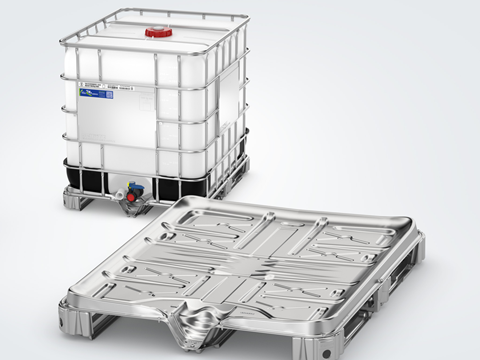
Schütz has unveiled a reusable, three-skid steel pallet for Intermediate Bulk Containers (IBCs), designed to optimize the distribution of heavy loads in production centres and customer logistics.
Aspiring for ‘outstanding’ rolling properties, the pallet targets streamlined transport, particularly at junctions. It is recommended for use in warehouses with any kind of conveyor solution, considered ‘particularly suitable’ for transport on conveyor systems with ‘equally impressive performance’ in high-bay warehouses.
Its geometry intends to achieve stability, strength, robustness, and optimum conveying properties. For instance, its large, smooth contact surfaces include an additional centre skid, set to increase contact surface space by 900%.
In turn, base pressure per square centimetre is thought to be lower. The load is also optimally distributed, which facilities the safe and reliable transport of heavy loads and high-density goods.
Meanwhile, its steel skids are embossed with a ribbed design to help resist deformation. Schütz emphasizes that the pallet displays ‘only minimal’ sagging, even when the IBCs it transports contain heavy products.
The pallet is designed for accessibility from all sides in pursuit of ‘supremely convenient’ handling during loading. Its lowered stringer height enables side entry with forklift or hand pallet trucks, while its stackability unlocks stacking and reducing volume.
Since it is made of steel as opposed to wood, it is expected to maximize cleanliness, abrasion resistance, and durability. It is therefore considered reusable and suitable for circularity, as well as cost-effectiveness.
Last summer, BW Flexible Systems revealed the SYMACH 3500S palletizer, which seeks to stack and palletize bags, bales, crates, and cases at high speeds. It was set for easy operation while tackling manufacturing footprint constraints and rejected shipments.
FM Vision’s Full Palletizing System also loads rows of vials and bottles into cases; its picking heads automatically adjust to the number and the spacing of containers. One of two robots insert rows of containers into reusable crates or cases, while the second supplies empty crates for filling and places completed ones on the output pallet.
Meanwhile, Henkel attended Fachpack 2024 with its ‘anti-slip’ Technomelt Supra PS range. This solution seeks to stabilize stacked goods on pallets during transport and enable higher stacking without compromising on safe transportation, all without relying on large amounts of plastic film.
Most recently, DS Smith helped Vilsund Blue A/S replace plastic pallets with corrugated cardboard in the transport of its canned seafood products. In doing so, the companies aimed to eliminate plastics from the process and increase the number of cans delivered per pallet.
If you liked this story, you might also enjoy:
The ultimate guide to the Packaging and Packaging Waste Regulation in 2024
How are the top brands progressing on packaging sustainability?
Sustainable Innovation Report 2024: Current trends and future priorities
Everything you need to know about global plastic sustainability regulation














No comments yet